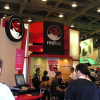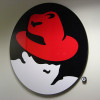What's Linux without Microsoft?
For some in the open source community, the forces of software development
have come to resemble the age-old paradox of Yin and Yang, which states
that light does not exist without dark and there is no good without evil.
According to luminaries who subscribe to this philosophy, and who spoke
about it last week in San Francisco at the LinuxWorld Conference and Expo,
the mere presence of Microsoft Corp. has played a big role in the development
of the Linux operating system and other open-source projects. Indeed, for
some there could be no Linux without Microsoft.
"This balance of action and counter action is absolutely critical," said Dirk Hohndel, the co-creator of
the XFree86 open source project and former chief technology officer at Linux distributor SuSE Linux
AG. "It makes people innovate."
The software maker from Redmond, Washington, has hovered like a thick cloud over the open source
community for as long as the loose-knit band of developers has worked on Linux, the flagship operating
system of open source. Top Microsoft executives have criticized Linux and the software license that
governs its free use, portraying it as an enemy of intellectual property .. Meanwhile, the software
maker has continued to develop products aimed at the same markets Linux plays in, from server software
to embedded operating systems.
Some agreed that the success of open source has depended at least in part on its chief rival always
being in the picture.
"It is definitely true that having a common foe does give you something to shoot at, and it would be
really easy to get lazy if somebody weren't out there to eat your lunch," said Eric Allman, co-founder
and chief technology officer of Sendmail Inc., which offers a widely used open-source e-mail server
program. "I'm just hoping that we don't fall into a pattern of simply playing catch-up with Microsoft,
which is a danger."
The idea that innovation has emerged through competition with Microsoft has surfaced in several
forms. Most recently, a group of programmers launched a project called Mono, intended to provide an
open-source, Linux-based version of Microsoft's .Net platform for developing Web-based services. The
group has promised that Mono will include .Net-compliant components that let developers create .Net
applications for Windows, Linux or any other platform.
Rob Enderle, an analyst with Giga Information Group Inc., portrayed the relationship between Microsoft
and Linux as a symbiotic one.
"Linux keeps Microsoft working hard in the government and education markets. Microsoft is, of course,
what keeps the open source community together. Without Microsoft, they would be a lot more
fragmented," Enderle said. "Both of them require the other to be in place."
Microsoft's omnipresence was apparent at the show in statements from executives of open source
companies. "Microsoft is the largest software company in the world. They are our competition," Larry
Augustin, chief executive officer of VA Linux Systems Inc., said in an interview. "The day when they're
not the competition is when we'll stop talking about them."
Augustin and Hohndel joined other open source leaders in a panel debate at the conference, which turned
into a discussion of how open source and proprietary software will coexist in the future. Linux creator
Linus Torvalds emerged as the most vocal antagonist to the theory that Microsoft and open source will
continue to exist as polar opposites. He argued that the open-source development model will someday
prevail over Microsoft's focus on closely guarded proprietary code. In 50, years he said, all software
development will be open source.
"People will realize that software is not a product; you use it to build a product," the Finnish
programmer said. Based on this prediction, Torvalds, who now works for microprocessor start-up Transmeta
Corp., said software will become a commodity that vendors will no longer need to control through strict
copyrights, putting the proprietary model out of business.
"I don't think (open source) has the slightest chance of getting 100 percent market share," Hohndel
countered. "It will be successful for commodities." Specialized software, however, will always depend on
companies that build proprietary programs, he said.
Jeremy Allison, co-creator of the open-source product Samba, a Windows-compatible file and print server,
agreed that Microsoft will not easily be knocked from its perch. The software maker's dominance in the
operating system market has tilted the playing field, he said. Because Microsoft has been able to
dictate much of what gets shipped on PCs, Linux and other open-source software faces an uphill battle.
"You have to break the client monopoly," Allison argued. There is no way to overtake Microsoft in market
share "if you can't control what's shipped on the client," he said.
While open-source software continues to gain recognition and momentum among enterprise users, one
LinuxWorld attendee said Microsoft will always have its hand in the software industry, and that its
presence will continue to drive innovation from rivals.
"It always comes back to Microsoft," said the attendee, a San Francisco-based software engineer who
requested anonymity. While he agreed that Microsoft often dominates any discussion about software, it's
not always about good vs. evil. "It's not as much about Microsoft being evil as it is just a force to be
reckoned with."






































































